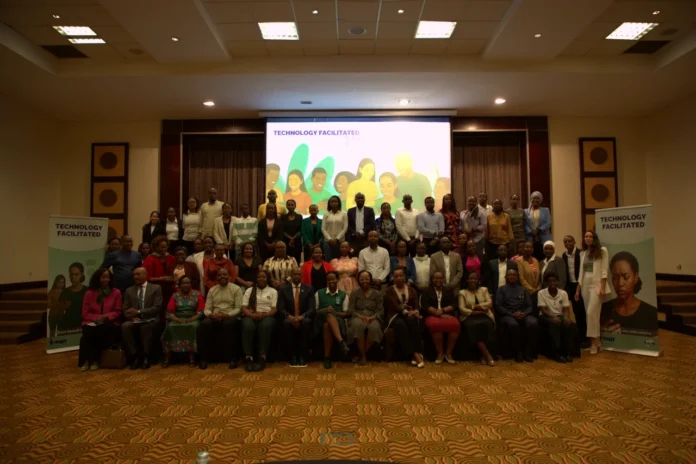
By Staff Writter, Rwanda Women Magazine
Kigali, Rwanda – 6th November 2025: Yesterday, Kigali hosted a landmark national dialogue on Technology-Facilitated Gender-Based Violence (TFGBV), bringing together government officials, UN agencies, civil society organizations, journalists, digital influencers, and youth. Organized by RWAMREC in partnership with Inspire Impact Hub, the event focused on the rising challenge of online harassment, cyberstalking, sextortion, and non-consensual sharing of intimate content—threats that have real-world consequences for women and vulnerable groups in Rwanda.
Digital Spaces, Real Harms

Fidele Rutayisire, Executive Director of RWAMREC, urges collective action to combat Technology-Facilitated Gender-Based Violence and safeguard digital spaces for women and youth in Rwanda
Fidele Rutayisire, Executive Director of RWAMREC, opened the dialogue by sharing insights from the Generation G program. He highlighted the social, psychological, and economic toll of TFGBV and called for a coordinated national response. “We must promote positive masculinity and safeguard digital spaces for all Rwandans,” he said, emphasizing that TFGBV is not just a digital issue but a societal concern.
Strengthening Legal Frameworks

“Legal frameworks must keep pace with technology.” Eraste Rurangwa, MICT Permanent Secretary, at the TFGBV Dialogue in Kigali.
Eraste Rurangwa, Permanent Secretary of the Ministry of ICT and Innovation (MICT), emphasized that Rwanda’s legal frameworks must keep pace with rapid technological growth. He announced the upcoming Humura App, a confidential platform connecting survivors with experts, set to launch during the 16 Days of Activism. Rurangwa also called for collective action from media, telecoms, civil society, and government agencies to ensure online spaces are safer and survivor-centered.
Who is Most at Risk?

“Digital abuse has real-world consequences.” Gisele Umutoniwase shares key findings on TFGBV at the Kigali dialogue
Research presented by Gisele Umutoniwase, RWAMREC’s Director of Programs, revealed that young women, public figures, activists, and LGBTQ+ individuals are disproportionately affected. With over 12 million mobile subscribers and more than 1.3 million active social media users, platforms like X, WhatsApp, and YouTube have become common arenas for abuse. Despite Rwanda’s progress through the GBV Law (2018) and Data Privacy Law (2021), TFGBV lacks explicit recognition in the Penal Code, leaving survivors vulnerable to trauma, victim-blaming, and social isolation.
Gisele called for digital literacy campaigns, survivor-centered services, and multi-stakeholder collaboration, stressing that protecting women online requires coordinated efforts from government, civil society, families, schools, and tech companies alike.
Global Perspectives, Local Action

National and global voices align to make Rwanda’s digital spaces safe for all — insights from the TFGBV Dialogue panel.
Panelists from UN agencies and government highlighted lessons from both local and global contexts. Nicholas Muneza (UN Women) noted that 38% of women worldwide experience online violence, while Thérèse Karugwiza (UNFPA) emphasized integrating digital safety education into schools. MIGEPROF’s Jean Baptiste Hitimana outlined policy updates, including multimedia campaigns, enhanced reporting mechanisms, and integration of TFGBV into revised GBV frameworks.
A Collective Responsibility

Framing TFGBV as a national security issue, Rose Rwabuhihi of Inspire Impact Hub urges Rwanda to act decisively to protect its digital spaces
Rose Rwabuhihi from Inspire Impact Hub framed TFGBV as a national security issue:
“Technology-Facilitated Gender-Based Violence spreads harm through our communities and families. We must act now.”
Three main priorities emerged:
- Legal reforms – Criminalize TFGBV explicitly and protect survivors.
- Digital literacy – Equip citizens, particularly youth, to navigate online spaces safely.
- Partnerships – Unite government, civil society, and private sector actors for prevention and response.
Yesterday’s dialogue marks a decisive step toward ensuring Rwanda’s digital spaces are safe, inclusive, and empowering, signaling sustained action during the 16 Days of Activism and beyond.
3 Key Takeaways from the TFGBV Dialogue
- Technology is double-edged: While it connects people, it also exposes women and vulnerable groups to harassment, cyberstalking, and sextortion.
- Legal gaps exist: TFGBV is not yet explicitly defined in Rwanda’s Penal Code, leaving survivors without clear legal protection.
- Collaboration is crucial: Government, civil society, media, and tech platforms must work together, alongside education and awareness campaigns, to create safe digital spaces.


